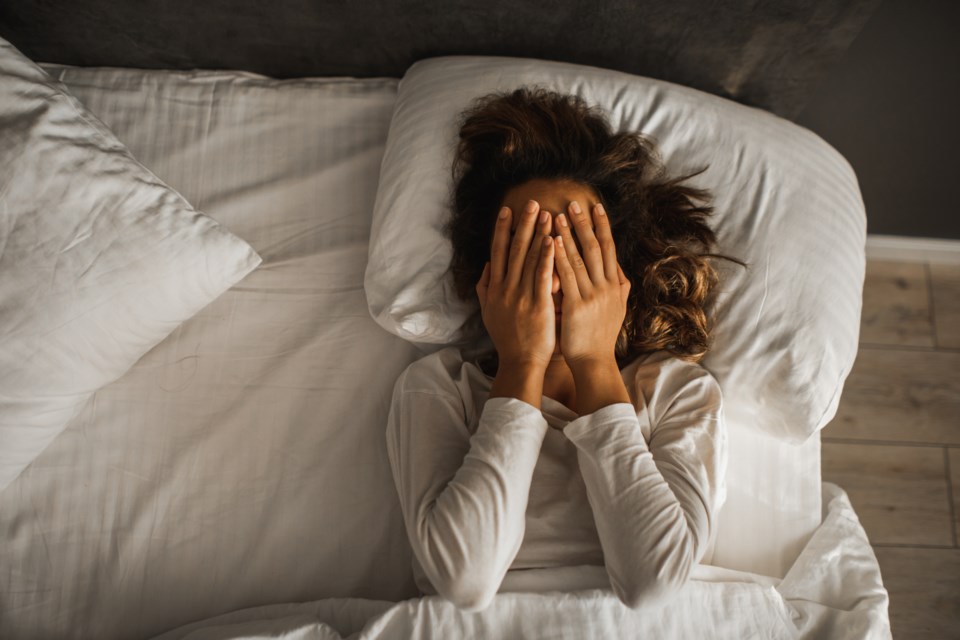For the past few years, Health Canada has issued guidelines related to the number of hours of sleep that Canadians should get every night. The government body recommends seven to nine hours for people aged 18 to 64 and seven to eight hours for anyone over the age of 65.
Research Co. and Glacier Media have been tracking the sleep patterns of Canadians since late 2019. Our latest survey shows that a significant proportion of residents are not meeting Health Canada’s directives. There is also some fluctuation on the issues that are taking away our peaceful rest at night.
Just over a third of Canadians (35 per cent) are sleeping anywhere from seven to nine hours on a typical weekday or workday. This leaves almost two-thirds of the country’s adults (64 per cent) who are not resting as much as they should.
On weekday sleeping time, the numbers are back to the level first reported in December 2019 (35 per cent) and lower than what we found in May 2021 (38 per cent).
This year, Quebec emerges as the champion on meeting Health Canada’s recommended sleep guidelines on weekdays (40 per cent), followed by Atlantic Canada (39 per cent) and Alberta (36 per cent). The proportions are lower in Saskatchewan and Manitoba (31 per cent), Ontario (also 31 per cent) and British Columbia (28 per cent).
We continue to be slightly more successful on weekends, even if the numbers are in a downward trend. This year, 43 per cent of Canadians report sleeping from seven to nine hours on a typical weekend or non-workday, down three points since 2021.
Again, Quebecers are the most likely to be meeting the seven-to-nine hour threshold on weekends (51 per cent) than their counterparts in Atlantic Canada (47 per cent), British Columbia (42 per cent), Alberta (also 42 per cent), Ontario (40 per cent) and Saskatchewan and Manitoba (also 40 per cent).
There is little change in the way Canadians feel after waking up. Practically seven in 10 (69 per cent) say they are “well rested” after a typical night’s sleep on a weekday or workday, consistent with the 70 per cent observed in both 2020 and 2019. Just over three in four (76 per cent) also feel “well rested” when waking up after a typical night’s sleep on a weekend or non-workday, similar to the 75 per cent reported in 2020 and higher than the 71 per cent from 2019.
Another finding has remained remarkably consistent. One in four Canadians (25 per cent) say they never find it hard to fall asleep at night on an average week, including 31 per cent of men, 33 per cent of those aged 55 and over and 29 per cent of Quebecers. Conversely, about one in five Canadians (19 per cent) find it difficult to fall asleep five to seven days a week, including 22 per cent of women, 23 per cent of those aged 18 to 34 and 23 per cent of Albertans.
In spite of steadiness of some indicators, there are changes in the aspects of our lives that negatively impact our ability to rest. This month, 50 per cent of Canadians acknowledge that worrying about money and financial matters made it harder for them to fall asleep at night over the past month. This represents a seven-point increase from the last time we asked this question in May 2021, with women (55 per cent) and Canadians aged 18 to 34 (58 per cent) more likely to be affected by these matters.
The momentum is not particularly pronounced for two other sources of worry. A third of Canadians (33 per cent, down three points) have had trouble falling sleep because they are preoccupied with relationships and family. An additional third (33 per cent, up one point) have found it hard to rest because of concerns about health.
We continue to see about one in 10 Canadians losing sleep at night on account of domestic politics and issues (10 per cent, unchanged) or international politics and issues (also 10 per cent, up one point). There is one area where the trend is ominous. This month, 28 per cent of Canadians found it hard to sleep because of concerns about work, up four points since May 2021 and reaching 40 per cent among Canadians aged 18 to 34.
Three waves of nationwide research have yielded some fascinating numbers. A large proportion of Canadians are falling short on meeting Health Canada’s recommended sleep guidelines. While we do continue to see a majority of adults who feel refreshed when waking up, concerns about money are keeping more of us awake than last year.
Mario Canseco is president of Research Co.
Results are based on an online study conducted from November 18 to November 20, 2022, among 1,000 adults in Canada. The data has been statistically weighted according to Canadian census figures for age, gender and region in Canada. The margin of error – which measures sample variability – is plus or minus 3.1 percentage points, 19 times out of 20.





.jpg;w=120;h=80;mode=crop)